Sun 7 Feb 2010
THE GOLD MEDAL CORNER, by Bill Crider: CLIFTON ADAMS.
Posted by Steve under Columns , Reviews[11] Comments
by Bill Crider
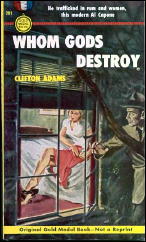
There are plenty of undiscovered treasures waiting out there in those old Gold Medal Books, some of them by authors you may never have heard of. Clifton Adams is a case in point.
His name is probably much more familiar to readers of western novels than to readers of crime fiction because he was much more successful as a western writer. But he wrote a couple of crime novels for Gold Medal that are well worth seeking out, Whom Gods Destroy and Death’s Sweet Song.
These books are of the James M. Cain school, and while they don’t quite come up to the best of Cain, they belong on the same shelf.
Both books are set in small Oklahoma towns. Whom Gods Destroy is the story of Roy Foley, who returns to his hometown of Big Prairie on the death of his father only to discover that his life is still ruled by his feelings of love and hate for a woman named Lola.
In fact, his feelings for her have pretty much driven him crazy, though he doesn’t know it. He finds another woman named Vida (I’ll leave all discussions of symbolism to the English majors among you), but even his attraction to Vida isn’t enough to save him.
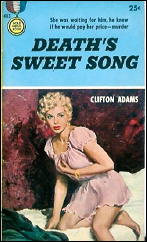
To hear him tell it, Foley is one of those hardluck guys, plenty smart, but he’s just never gotten the break he deserves. He thinks he’s found the chance in Big Prairie, however. He’s going to take over the thriving bootlegging trade in the town, and he’s going to do it fast.
He gets off to a bad start, as his first plan goes wrong. So does his second. And his third. Each time something goes wrong, he pays a price, and just when his plans finally seem to be working out, things fall apart.
Roy winds up in a cheap hotel and in despair: “Out of the emptiness, I kept thinking: What are you going to do, Foley? What are you going to do? There had to be an answer — if I could only find it. Lost somewhere in the violence and rage there was an answer.”
The guy in Death’s Sweet Song is Joe Hooper. He owns a little filling station with a couple of tourist cabins out back in Creston, Oklahoma. Like Roy Foley, he’s waiting for his big break, and one day it shows up in the persons of a safecracker named Sheldon and his wife, Paula.
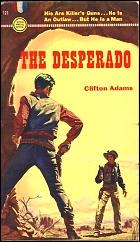
Paula is one of those women who often turns up in stories like this: bad clear through, and as beautiful as she is bad.
Before long, Joe finds himself involved in robbery and murder, and at the end of his downward spiral, he’s thinking a lot like Foley: “I looked at them and they were waiting for the answer. They wanted a simple, clear-cut answer, and there wasn’t one. It was a long story, almost a month ago, I thought; that was when I saw her for the first time . . . Less than a month ago it had been. It seemed like a thousand lifetimes.”
The simple plot summaries don’t do much to convey the quality of writing in these books. It’s the real thing. Uncluttered prose, smooth, and assured, with just the right amount of description to make things real and immediate.
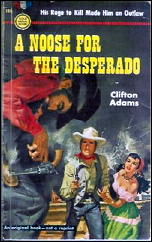
GOLD MEDAL BONUS: If you’re curious about Adams’s westerns, I highly recommend two of his earliest, The Desperado and A Noose for the Desperado.
These are dandy noir westerns with a protagonist worthy of Jim Thompson. They’re hard to find, though. They hardly ever turn up even on eBay. Copies of Death’s Sweet Song and Whom Gods Destroy show up now and then, and no one even bids on them. Maybe people don’t know what they’re missing, but if you’ve read this far, you don’t have that excuse.
NON-GOLD MEDAL BONUS: Adams also wrote a paperback original for the Ace Double line. He used the name Jonathan Gant, and the book is one half of D-157, Never Say No to a Killer.
It seems to have been influenced by Horace McCoy’s Kiss Tomorrow Good-Bye, as it’s narrated by an intellectual killer and begins with an escape from a prison work gang. Roy Surratt deludes himself in much the same way that Joe Hooper and Roy Foley do, though he’s well aware that he’s far from the innocent they think themselves to be before they begin their crime sprees.
This book has a nice twist in that it doesn’t appear to be a mystery novel until the very end, when it’s revealed that one character was indeed doing some detecting and putting the clues together. Maybe this one’s not quite in the league with the two Gold Medals, but it’s worth a read.
In a way it’s too bad that Clifton Adams found his biggest success writing westerns and didn’t write more crime novels. He was very good at it.
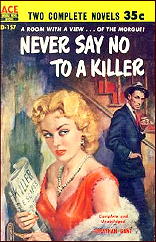
Selected Bibliography:
â— Death’s Sweet Song. Gold Medal #483, pbo, May 1955.
â— Whom Gods Destroy. Gold Medal #291, pbo, March 1953.
â— The Desperado. Gold Medal #121, pbo, 1950.
â— A Noose for the Desperado. Gold Medal #168, pbo, 1951.
â— Never Say No to a Killer, as by Jonathan Gant. Ace Double D-157; pbo, 1956.
Editorial Comments: This column first appeared in Mystery*File #42, February 2004. Covered in previous installments appearing online are authors Day Keene, Dan Marlowe, Charles Williams, Marvin Albert, and Bill Pronzini & Ed Gorman.
A checklist of the western novels Adams wrote as Clay Randall can be found here earlier on this blog. [LATER:] In comment #5, I’ve listed all of Adams’ westerns that I own which were written under his own name.
And look for additional commentary by Bill on the Jonathan Gant book over on his blog, where it was a “Forgotten Friday Book” a week or so ago.
February 8th, 2010 at 1:45 am
I love that “Never Say No to a Killer” illustration. Tis a thing of pulpy beauty.
February 8th, 2010 at 2:03 am
No argument from this quarter, Curt. None at all.
February 8th, 2010 at 9:13 am
Great piece…I picked up a rather battered copy of The Desperado about ten days ago at a bookstore in St. Pete.
February 8th, 2010 at 12:13 pm
I’ve been trying to find a copy of DEATH’S SWEET SONG for quite some time, and haven’t had a bit of luck. Someday, I hope, one’ll come my way.
February 8th, 2010 at 12:48 pm
Mark
A battered copy is better than none. According to my records, though far from complete, that’s one I don’t have myself.
Here’s a list of Clifton Adams’ westerns that I’ve catalogued in so far:
CLIFTON ADAMS –
The Badge and Harry Cole (Ace Charter 04699; c.1971; 1st Ace pr.) W22 vg+
Concannon (Manor 95414; c.1972; Manor book, 1975) W22 vg-fine
The Dangerous Days of Kiowa Jones (Avon F234; c.1963; 1st Avon pr., Apr 1966) W56 vg-fine
Day of the Gun (Ballantine 569; c.1962) W1 good
The Grabhorn Bounty (Ace F-404; c.1965) W1 vg
Hard Times & Arnie Smith (Ace 31720; c.1971-72) W70 vg-fine
Hogan’s Way (Berkley Y718; c.1963; Berk edn, Jan 1963) W76 vg+
The Hottest Fourth of July in the History of Hangtree County (Berkley C1196; c.1964) W109 vg
Killer in Town (Dell 1st Edn A199; c.1959; 1st pr., Dec 1959) W112 n.fine
The Last Days of Wolf Garnett (Ace 47080; c.1970; 1st Ace pr., Aug 1973) W88 n.fine
Law of the Trigger (Gold Medal 593; c.1956; 1st pr., Aug 1956) W76 vg-g
The Moonlight War (Gold Medal s1274; c.1963; 1st pr., Feb 1963) W109 vg-g
The Moonlight War (Gold Medal D2186; c.1963) W86 fine
The Most Dangerous Profession (Award A378X; c.1967; 1st Award pr., 1968) W64 vg-fine
A Noose for the Desperado (Gold Medal 168; c.1951) W1 vg
A Noose for the Desperado (Gold Medal s1375; c.1951; 3rd pr., Jan 1964) W106 vg-fine
Once an Outlaw (Ace Double 62732; c.1970) W87 good
A Partnership with Death (Ace G-708; c.1967) W14 good
Reckless Men (Ace Double 62732; c.1962) W87 good
Shorty (Ace G-628; c.1966) W95 n.fine
Shorty (Ace 76171; c.1966; 2nd Ace pr., Aug 1973) W53 vg
Stranger in Town (Ppbk. Library 51-146; c.1960; 1st PL pr., June 1962) W20 vg-fine
— Steve
February 8th, 2010 at 12:59 pm
Ron C
I don’t know why DEATH’S SWEET SONG is so scarce, but it is. Looking on the Internet just now, I found two copies for sale, one on Amazon-UK, the other on biblio.com. The latter will set you back $20 for a book quoted as being in Good Plus condition.
(The former will cost you more in shipping than for the book itself.)
— Steve
February 8th, 2010 at 1:33 pm
Thanks, Steve — I didn’t check Biblio. Good Plus sounds a bit rough…but I’ve sent him a query to clarify condition. In the meantime, Bill Crider kindly suggested Munsey’s, where I was able to download the book for free. I don’t read fiction well electronically — but beggars can’t be choosers. Might end up just printing the thing out.
February 8th, 2010 at 2:38 pm
I know what you mean. In some (most?) dealers’ parlance, “Good” means not Very Good.
As for reading fiction on the computer screen, I’m with you. I don’t do it. I started downloading ebooks a couple of years ago, but when I realized that they were just sitting there (and still are), I stopped.
I did think of printing them out, as you say you might, but the time required and the amount of paper needed sort of conspired against me. Haven’t done that either.
February 8th, 2010 at 6:37 pm
Concerning reading fiction on the computer screen or even on e-books, I just don’t feel comfortable. I can read blogs like Mystery File and articles, etc, but reading fiction is a real chore and not enjoyable at all. I’ll continue with the book format, afterall it’s been around for like 500 years. So they must be doing something right.
February 12th, 2010 at 7:40 am
I guess it is the Scots in me, but given the choice between a free read on line and $20 for a paperback for a relatively minor writer I can put up with on line reading. Even if you print out a relatively short book like this one it will cost you less than $20 and postage.
Not that I wouldn’t prefer the actual book in hand, but this is a case where the reader wins out over the collector. If I find I really like a book I can always buy it later if I can find it at a reasonable price.
That said, I think those of us primarily working from laptops probably are more cavalier about reading books on screen than those sitting at a desk with a regular PC. I find I read ebooks more readily since the laptop than when I had to fire up the PC in the office and work at a desk.
And Munseys has really been good about pulp and paperback material, particularly Gold Medal paperbacks with free downloads of books by Dan Marlowe, Ed Lacy, Adams, and others that would have added up to a few bucks in postage alone. As I said before anything that really strikes my fancy I can always try to find in print and buy later.
August 13th, 2010 at 4:53 pm
[…] was Clifton Adams, Jonathan Gant being a pen name he sometimes used. You can read the entire piece here on the […]